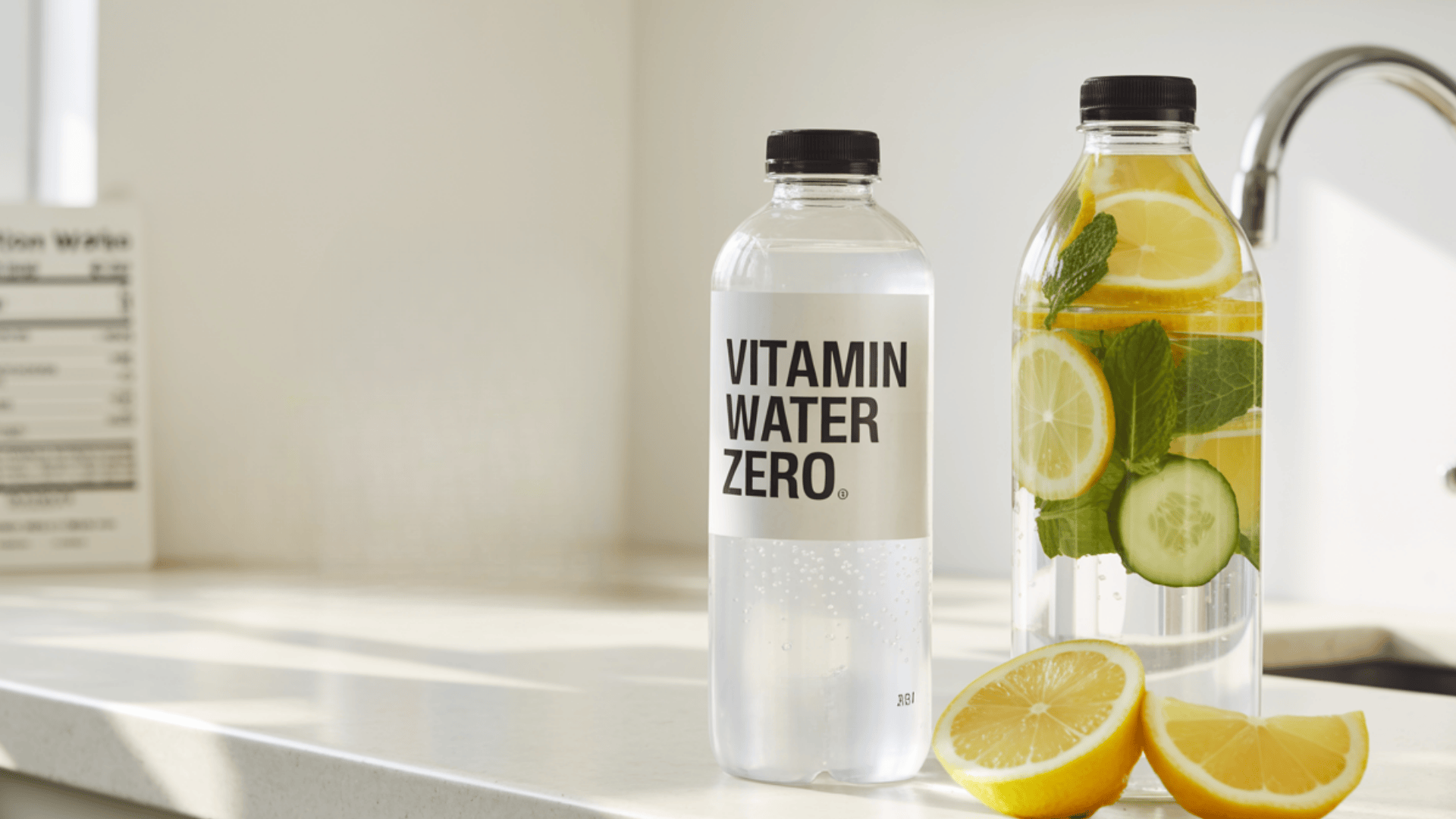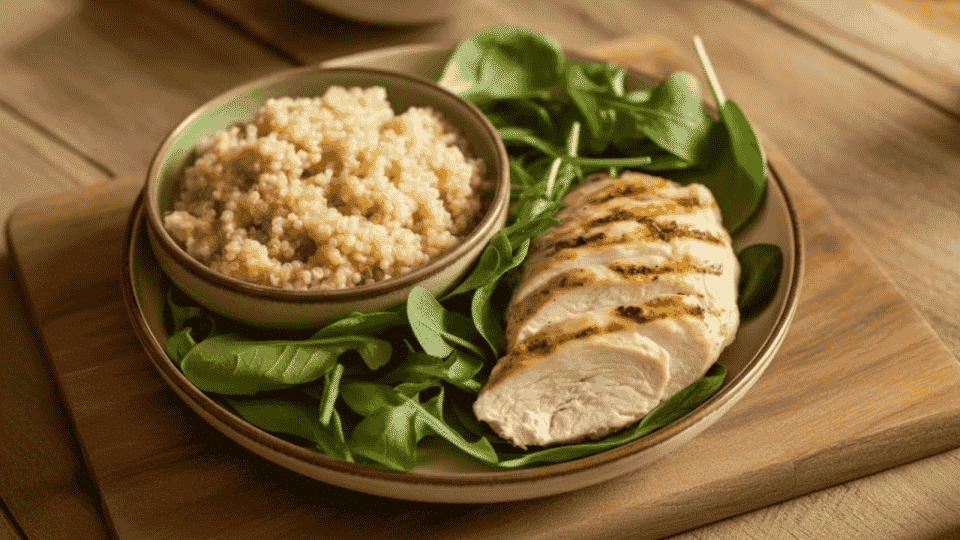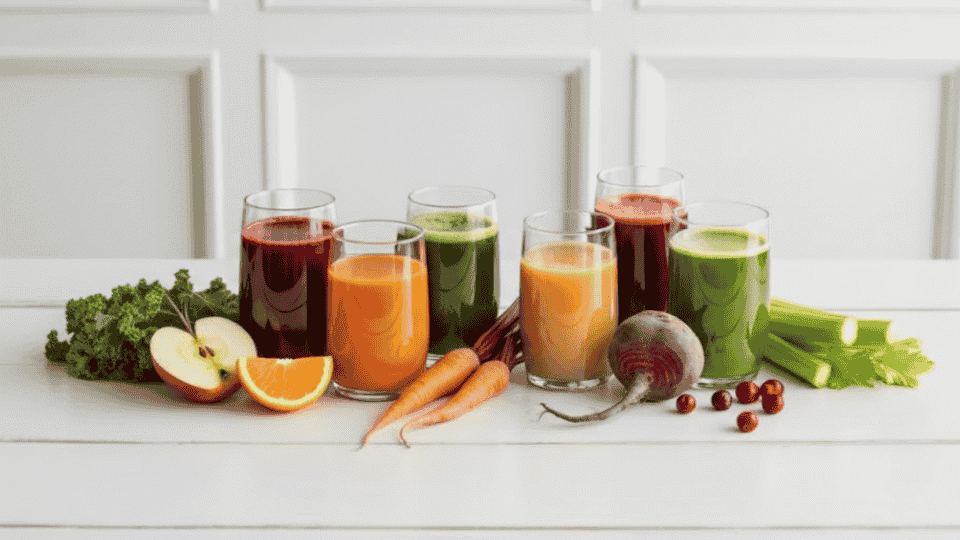It looks healthy, tastes great, and promises vitamins, but is it good for your body? With so many flavored drinks on the shelves, it’s easy to wonder if Vitamin Water is good for you or just clever marketing.
If you’re unsure about drinking it daily or choosing the best version, this blog is for you. I’ll walk you through what’s inside, the benefits and downsides, and how it compares to soda and sports drinks.
You’ll also find healthier options and expert opinions to help you make smarter choices. So, before you grab your next bottle, stick around; what you learn might surprise you.
Is Vitamin Water Healthy?
You’re probably wondering if Vitamin Water is good for you, or just another trendy drink.
Many bottles claim to boost energy, hydration, and immunity. But what’s inside? And does it help or hurt your health in the long run?
In this blog, you’ll get a clear, honest look at the pros and cons of drinking vitamin water. We’ll break down the facts in simple terms, so you can decide what’s best for you. No hype. Just the truth backed by science.
Before we talk about how good or bad vitamin water is, let’s look at what’s actually in it
Each bottle may look healthy, but the ingredients can vary significantly depending on the type you buy.
1. Core Components (Water, Vitamins, Electrolytes)
Most vitamin waters start with plain water.
Then, they add Vitamins like B6, B12, and C, as well as Electrolytes such as potassium, sodium, and magnesium.
These ingredients help with energy, hydration, and basic body functions.
2. Added Sugars or Sweeteners (Natural & Artificial)
Some types contain a lot of added sugar, just like soda.
Others use artificial sweeteners or sugar alcohols like Stevia, Erythritol, and Sucralose.
These sweeteners lower the calorie count but may still affect your gut or cravings.
3. Preservatives, Flavors, and Colorants
To make vitamin water taste good and last longer, companies also add: Preservatives like citric acid or potassium sorbate, Natural or artificial flavors, and Colorants from fruit juice or artificial dyes
These aren’t harmful in small amounts, but they don’t add nutrition either.
Comparing Common Types of Vitamin Water
Here’s a simple chart comparing common types:
| Type | Sweetened? | Vitamins & Electrolytes | Calories | Common Use |
|---|---|---|---|---|
| Original Vitaminwater | Yes (added sugar) | Yes | 120–130 | Taste + hydration |
| Vitaminwater Zero | No (uses sweeteners) | Yes | 0–10 | Low-calorie option |
| Homemade Vitamin Water | No (fruit-infused) | Small amounts | Varies | Natural alternative |
No matter which one you choose, the key is to check the label. Not all vitamin waters are the same.
Health Benefits of Vitamin Water
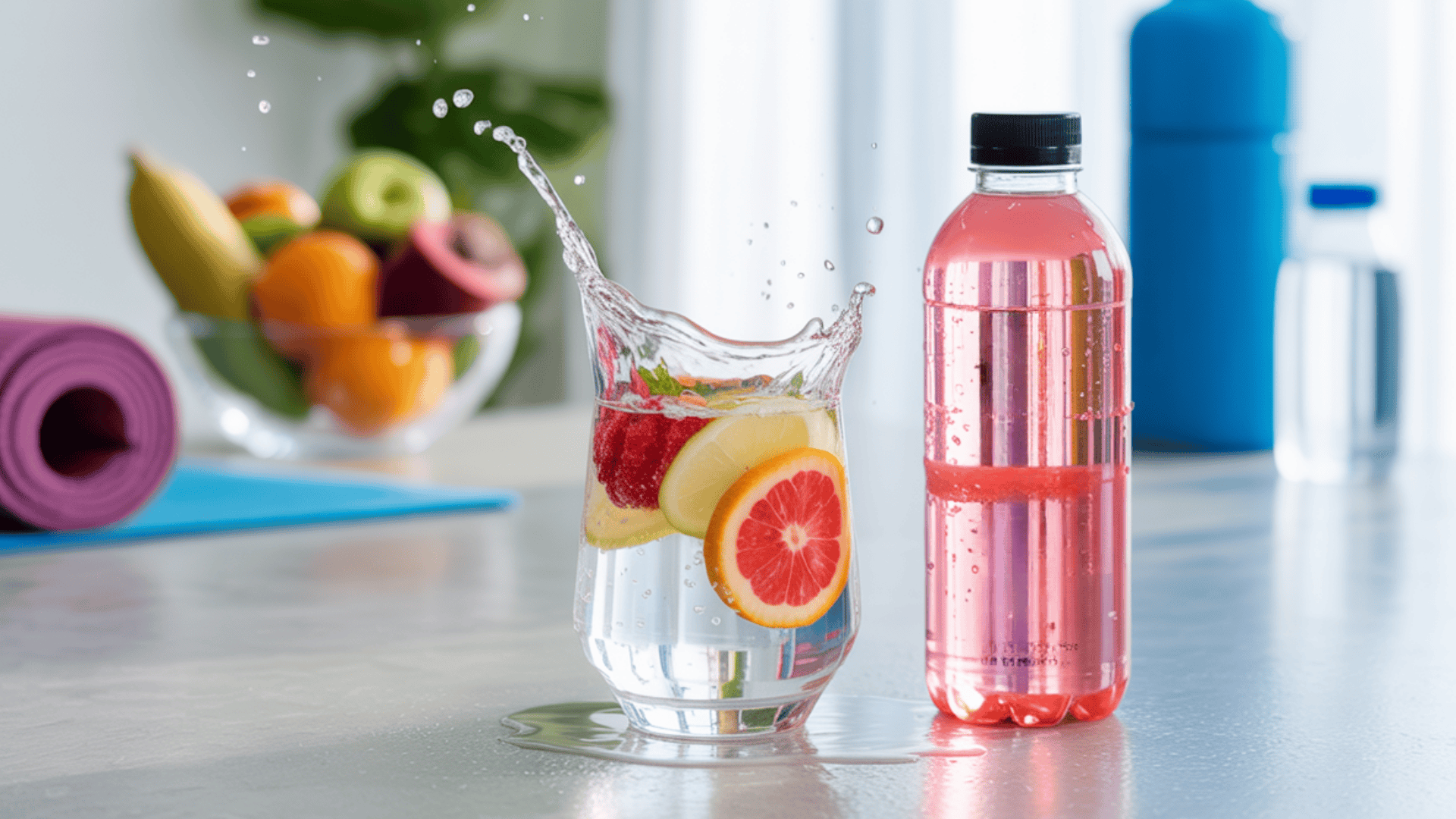
Vitamin water can offer some health benefits when used in the right situations. Here are a few ways it might be helpful:
- Helps you stay hydrated: The flavor makes it easier for people who don’t like plain water to drink more fluids.
- Replaces lost electrolytes: After sweating or exercising, it can help refill minerals like potassium and magnesium.
- Adds some vitamins: It often includes B vitamins and vitamin C, which support energy and immunity in small amounts.
- Better than soda or energy drinks: It usually has fewer calories and some nutrients, making it a healthier swap.
- May benefit certain groups: People with low nutrient intake or those recovering from illness might get a small boost.
When used occasionally and not as a main vitamin source, vitamin water can be a useful part of your routine.
Health Risks and Downsides of Vitamin Water
While vitamin water may seem like a healthy choice, it comes with some risks. Many versions are loaded with added sugar, about 25–30 grams per bottle, which can lead to weight gain, insulin resistance, and tooth problems.
Sugar-free types often use artificial sweeteners like stevia or sucralose, which may affect gut health or trigger cravings.
Compared to whole foods like fruits and vegetables, vitamin water offers very few real nutrients and lacks fiber. It’s also marketed as a health drink, but that can be misleading; it’s not a substitute for a balanced diet.
On top of that, it tends to cost more than it’s worth, especially if you’re already getting enough vitamins from food.
Is It Healthier Than Gatorade, Soda, or Just Water?
Many people compare Vitamin Water to other popular drinks like soda, sports drinks, and plain water. Here’s how they stack up when it comes to nutrition and daily use. Here’s a simple table to compare the key differences:
| Drink | Calories (per bottle) | Sugar | Vitamins | Sodium |
|---|---|---|---|---|
| Vitamin Water | 120–130 | 25–30g | Yes (B, C) | Small |
| Vitamin Water Zero | 0–10 | 0g | Yes (B, C) | Small |
| Gatorade | 140–150 | 34g | Minimal | High |
| Soda (Cola) | 150–160 | 39–42g | None | Small |
| Plain Water | 0 | 0g | None | None |
- Hydration: Plain water is still the best. It hydrates without sugar, calories, or additives.
- After Exercise: Gatorade helps if you’ve lost a lot of sweat. Vitamin water with electrolytes may help after light activity.
- Daily Use: Vitamin Water Zero is better than soda, but plain water or fruit-infused water is healthier overall.
Vitamin water may be better than soda or Gatorade in some cases, but plain water still wins for everyday use.
What About Vitamin Water Zero?
Vitamin Water Zero is the sugar-free version of the original drink. It has almost no calories and still includes added vitamins like B6, B12, and C. Instead of sugar, it uses sweeteners like stevia or erythritol.
This makes it a better choice if you’re watching your sugar or calorie intake. On the plus side, it won’t spike your blood sugar and may help with weight control.
But it still contains artificial or natural sweeteners, which can cause bloating or cravings in some people.
If you’re trying to lose weight, it’s a smarter pick than soda or regular vitamin water, but plain water or herbal tea is still healthier.
Better, Healthier Alternatives to Vitamin Water
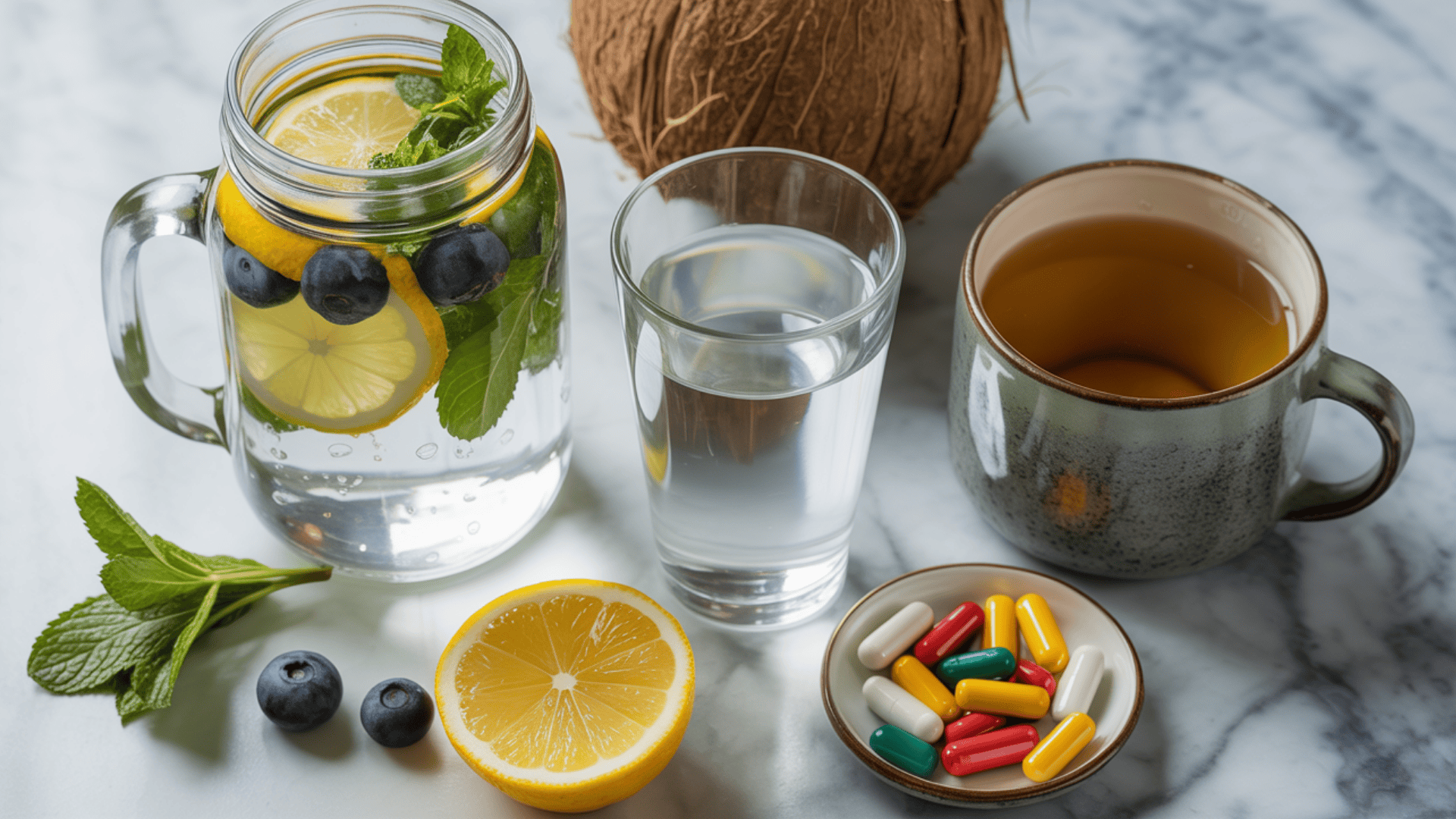
If you’re looking for healthier ways to stay hydrated or boost your vitamin intake, there are better options than bottled vitamin water. Here are a few simple and effective choices:
Fruit-Infused Water Recipes (DIY)
- Add slices of lemon, cucumber, berries, or mint to water
- Gives a light flavor without sugar or additives
- Easy to make at home and totally natural
Natural Electrolyte Drinks (Coconut Water, Herbal Teas)
- Coconut water contains potassium and magnesium
- Herbal teas hydrate without sugar or caffeine
- Great for light rehydration without fake ingredients
Multivitamin Supplements (as an alternative approach)
- Offers a full range of essential nutrients
- Doesn’t add sugar or calories to your diet
- Easy to pair with a healthy, balanced meal
These options give you more control over what goes into your body, without the extra sugar or sweeteners found in many bottled drinks.
Expert Opinions and Scientific Evidence
Health experts generally agree that vitamin water isn’t harmful in small amounts, but it’s not something to depend on.
Dietitians say most people don’t need extra vitamins from drinks if they eat a balanced diet. Doctors warn that the added sugar in many versions can be a problem, especially for kids and those with blood sugar issues.
Studies show that sugary drinks, even ones with vitamins, may still raise health risks if consumed often.
Some experts note that Vitamin Water Zero is a better choice for cutting sugar, but it still doesn’t replace real food or plain water.
Conclusion
Before grabbing a bottle, think about what your body needs. A little now and then is fine, but it’s not a shortcut to good health. Is Vitamin Water good for you? It comes down to your habits and health goals.
This guide helped you see both the pros and the downsides, like hydration support, sugar content, and better alternatives.
Stick with whole foods and plain water when you can. If you found this helpful, there’s more where that came from. Read my other blogs for simple, honest tips on staying healthy, hydrated, and informed, one wise choice at a time.
Frequently Asked Questions
Can kids drink Vitamin Water?
No, it’s not the best choice for children. Many versions are high in sugar, and kids generally don’t need added vitamins in drink form. Water or milk is a healthier option.
What happens if you drink too much Vitamin Water?
Drinking too much can add excess sugar or artificial sweeteners to your diet, which may lead to bloating, weight gain, or blood sugar issues, especially if you drink it daily.
Can Vitamin Water replace a multivitamin?
No, it can’t. It only includes a few nutrients, like B vitamins and vitamin C. A daily multivitamin offers a more complete range of nutrients if your diet is lacking.




